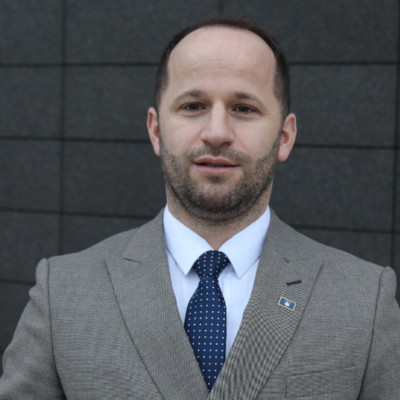
Labinot Hajdari – Doctor of Social Sciences in Political Science and Public Administration from the Faculty of Political Science and International Studies, University of Warsaw, Poland. He was a scholarship holder for Ph.D. studies from International Visegrad Fund (2017-2019).
Labinot is a lecturer at Civitas University. Previously he lectured at Public University “Kadri Zeka” and Universum College, Kosovo. He is the founder and Executive Director of the Kosovo International Summer Academy; co–founder and Executive Director of the Kosovo Center of Diplomacy. Labinot is a member of the Editorial Board of a Polish academic journal “Przegląd Europejski” (“European Review”). He has 8+ years of experience in the international relations office at the University of Prishtina, working on international cooperation, particularly in Erasmus projects (Erasmus Mundus, Erasmus+), etc. Dr. Hajdari also has experience as a Lead Editor for Europe and Balkans at the Czech News Agency PressEXPRESS.eu.
Research interest: nation branding and public diplomacy, project management, public policy, migration, governance, foreign policy, and security.
Published articles:
- J Krasniqi, L Hajdari, A Maliqi, K DeGroff Madsen ‘The Mirror Reflection of the Russian Invasion of Ukraine in The Western Balkans: Opening New Conflicts as a Distraction’ 2023 3 (20) Access to Justice in Eastern Europe 12-26. https://doi.org/10.33327/AJEE-18-6.3-a000317(Indexed: Scopus Q2, Web of Science – Emerging Sources Citation)
- Hajdari,L. From Propaganda to Public Diplomacy: Did Exchange Programs bring down The Cold War. Historical Views, VI. No. 9, 225-241(2023) link(Indexed: Scopus Q3)
- Hajdari, L., Krasniqi, J. The economic dimension of migration: Kosovo from 2015 to 2020. Humanities and Social Sciences Communications, 8, 273 (2021). DOI:1057/s41599-021-00923-6link (Indexed: WoS, SCOPUS Q1, etc).
- Krasniqi, J., Hajdari, L. The impact of COVID-19 pandemic on double marginalisation of women in Kosovo, Przegląd Europejski 4/2021: 115-129. DOI: 10.31338/1641-2478pe.4.21.7, link
- Hajdari, L, .The role of sports and music in public diplomacy: the case of Kosovo. Przegląd Europejski 3:189-203 (2019) DOI: 10.5604/01.3001.0013.5849link
- Hajdari, L., Ivanovic R. Aleksandar. Traditional Forms of Radicalism and Violent Extremism in the Western Balkans as the Main Challenge to Stability. Securitologia 2(1):79-93 (2018) DOI: 10.4467/24497436SCU.18.007.9930 link

